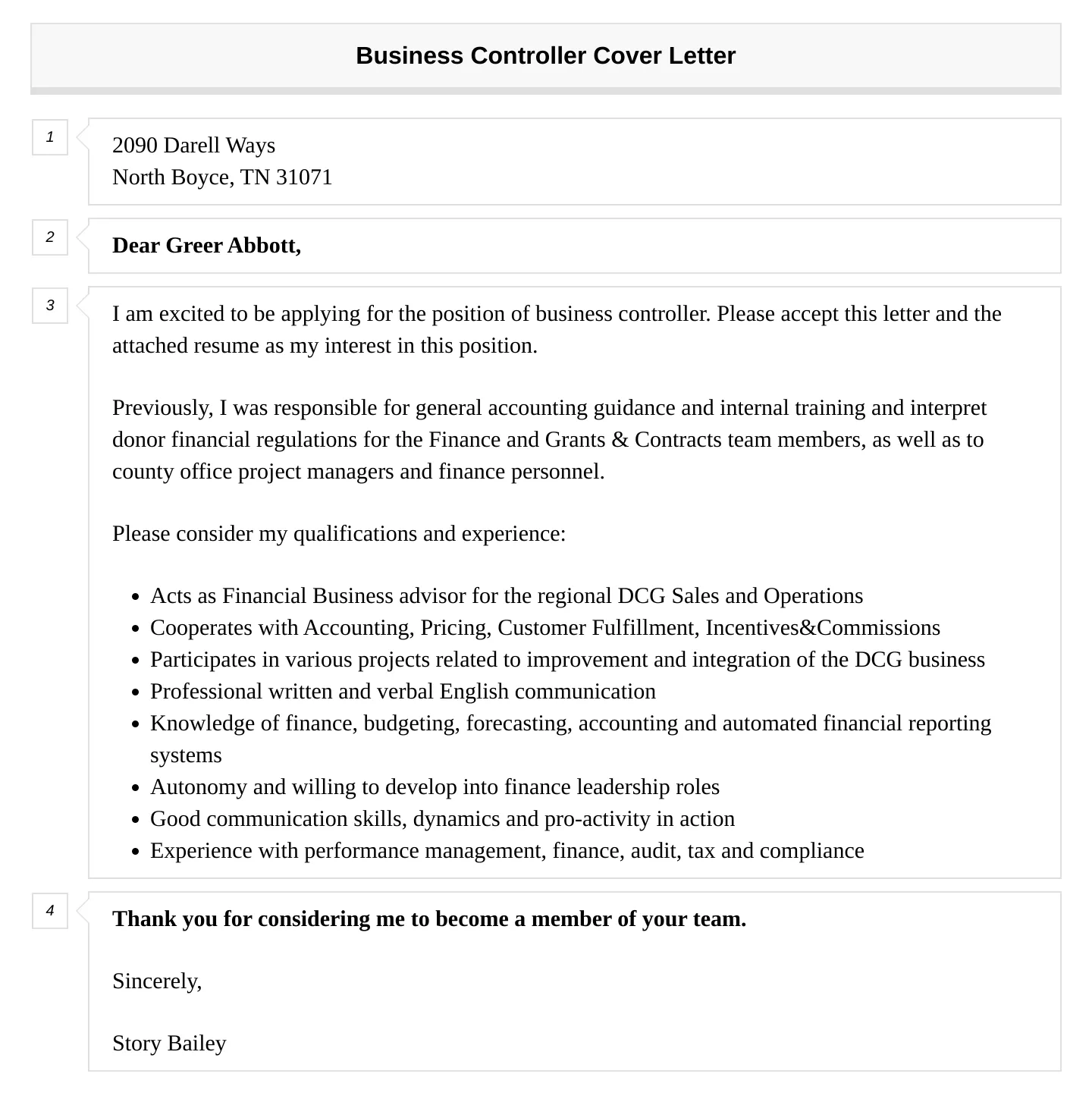Controller Cover Letter Why It Matters
A controller cover letter is more than just a formality; it’s your first chance to make a strong impression on a potential employer. In the competitive field of accounting and finance, a well-crafted cover letter can set you apart from other candidates, showcasing your skills, experience, and personality. It provides an opportunity to elaborate on your resume, highlighting specific achievements and demonstrating why you are the ideal fit for the controller position. This document is a crucial component of your job application, representing your professionalism and attention to detail, qualities highly valued in financial roles. A compelling cover letter can significantly increase your chances of securing an interview and ultimately landing your dream job. Make sure it reflects the candidate in the best way possible.
The Purpose of a Controller Cover Letter
The primary purpose of a controller cover letter is to introduce yourself to the hiring manager and express your interest in the position. It allows you to provide context to your resume, explaining how your skills and experience align with the specific requirements of the job. It’s your platform to explain why you are the perfect fit for the company and the role. The cover letter also demonstrates your communication skills and your ability to articulate your value proposition. By tailoring the letter to each job application, you show that you have done your research on the company and are genuinely interested in the opportunity. Furthermore, it offers a space to address any potential gaps in your resume or to explain unique circumstances relevant to your application. The letter also gives the opportunity to explain any situation that happened in the past and how you overcome it.
Key Components of a Controller Cover Letter
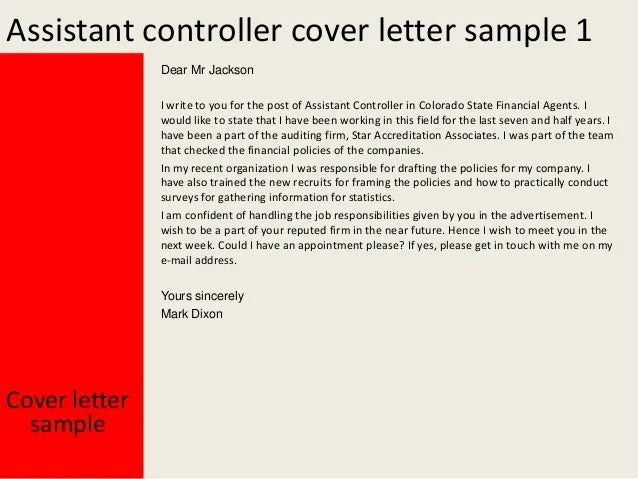
A well-structured controller cover letter consists of several key components that work together to create a compelling narrative. The first essential part is the header, which includes your contact information and the date, followed by the recipient’s details. Next comes the professional greeting, setting the tone for your communication. The opening paragraph should capture the reader’s attention by stating your interest in the position and briefly mentioning your relevant qualifications. The body paragraphs are where you showcase your skills, experience, and achievements, providing specific examples to support your claims. Conclude with a strong closing paragraph, reiterating your interest, expressing gratitude, and including a clear call to action. Proper formatting and attention to detail are vital throughout the document, ensuring it reflects your professionalism and attention to detail. Don’t forget to include all the keywords from the job description to get your resume and letter to the hiring manager.
Header and Contact Information
The header is the first element the hiring manager sees, so it must be accurate and professional. Include your full name, phone number, email address, and LinkedIn profile URL (if you have one). The date should be the date you are submitting the application. Below this, include the hiring manager’s name, title, and the company’s address. Ensuring this information is correct shows your attention to detail, a critical attribute for a controller role. Always double-check these details to make sure it’s correct. A well-formatted header sets a professional tone and makes it easy for the hiring manager to contact you.
Professional Greeting
The greeting should be formal and appropriate. If you know the hiring manager’s name, use “Dear Mr./Ms./Mx. [Last Name].” If you are unsure of the hiring manager’s name, use a general greeting, such as “Dear Hiring Manager” or “Dear [Company Name] Hiring Team.” Avoid generic greetings such as “To Whom It May Concern,” as they can make your letter seem less personal. Maintain a professional tone throughout the greeting to demonstrate your respect and understanding of workplace etiquette. Personalizing the greeting shows that you have taken the time to research the company and the specific role, making your application more appealing.
Opening Paragraph Grab Their Attention
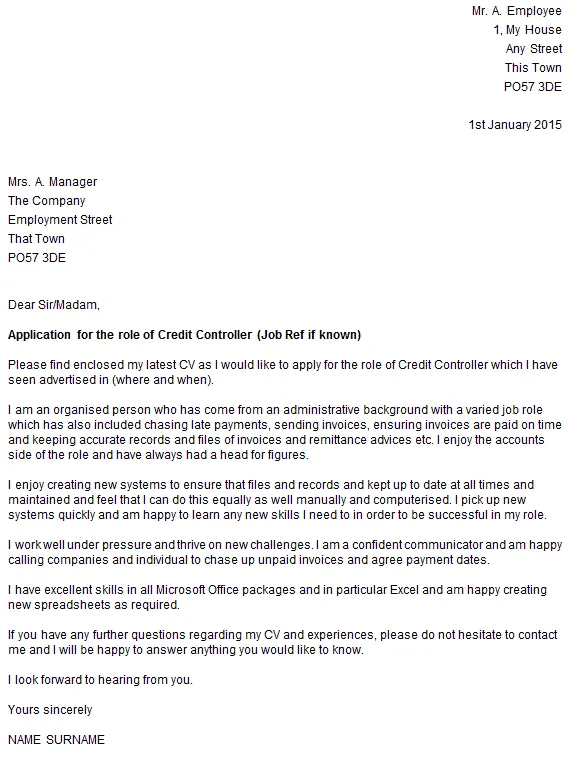
The opening paragraph is your chance to capture the reader’s attention and make a strong first impression. Start by clearly stating the position you are applying for and where you found the job posting. Then, briefly mention your most relevant qualifications or a key achievement that aligns with the job requirements. Highlight your enthusiasm for the company and the specific role, demonstrating that you have done your research. Keep the paragraph concise and engaging, aiming to pique the hiring manager’s interest and encourage them to read further. Focus on what makes you unique and how you can contribute to the company’s success. Your opening statement should make the reader want to continue reading and learn more about you. This paragraph sets the tone for the rest of your letter.
Body Paragraphs Showcasing Your Skills
The body paragraphs are the core of your cover letter, where you elaborate on your skills, experience, and achievements. Use these paragraphs to demonstrate how your qualifications align with the specific requirements of the controller position. Provide specific examples of your accomplishments, using the STAR method (Situation, Task, Action, Result) to illustrate your impact. Focus on your relevant skills, such as financial reporting, budgeting, forecasting, internal controls, and team leadership. Quantify your achievements whenever possible, providing measurable results to showcase your success. Tailor each body paragraph to match the job description, highlighting the skills and experiences that are most relevant to the role. This section allows you to present a detailed picture of your expertise and how it can benefit the company.
Highlighting Financial Expertise
In the body of your cover letter, dedicate a paragraph to highlighting your financial expertise. This is the cornerstone of a controller’s role, so demonstrate your proficiency in key areas. Discuss your experience with financial reporting, including your knowledge of GAAP or IFRS and your ability to prepare and analyze financial statements. Mention your experience with budgeting and forecasting, emphasizing your ability to develop and manage financial plans. Highlight your understanding of financial analysis, including variance analysis and performance reporting. Provide specific examples of how you have improved financial processes, reduced costs, or increased profitability in previous roles. Show that you have a strong grasp of financial regulations and compliance, as this is crucial for maintaining the integrity of the company’s finances.
Demonstrating Leadership and Management Skills
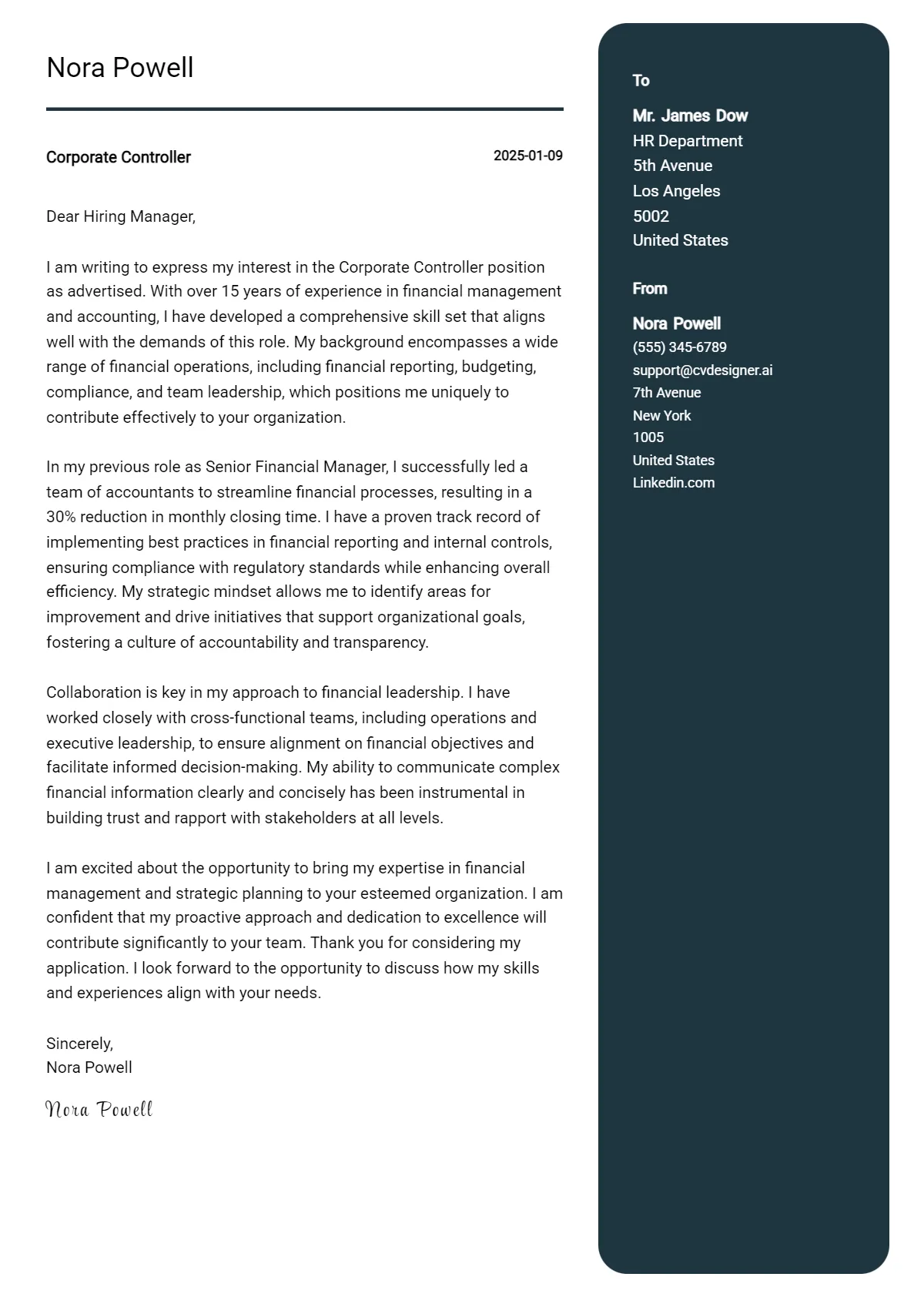
Controllers often lead teams, so it is essential to showcase your leadership and management abilities. Describe your experience in managing and mentoring accounting teams, highlighting your ability to motivate and develop your team members. Discuss your leadership style and how you create a positive and productive work environment. Provide examples of how you have successfully led projects, implemented process improvements, or resolved conflicts within a team. Mention your experience in setting goals, delegating tasks, and providing feedback. Highlight your communication skills, as controllers need to effectively communicate financial information to both financial and non-financial stakeholders. Emphasize your ability to build strong relationships and collaborate with other departments to achieve common goals. Leadership skills are key for the role.
Quantifying Achievements Showcase Results
To make your cover letter more impactful, quantify your achievements whenever possible. Instead of simply stating that you improved efficiency, provide specific numbers to demonstrate the extent of your success. For example, instead of saying “Improved financial reporting,” say “Improved financial reporting accuracy by 15% within one year.” Or, “Reduced monthly closing time by 20%.” Use data and metrics to showcase your accomplishments and provide concrete evidence of your value. If you have experience reducing costs, state the amount you saved or the percentage reduction. Quantifying your achievements demonstrates your ability to deliver results and provides tangible evidence of your impact in previous roles. This provides proof of the claims.
Closing Paragraph Call to Action
The closing paragraph should reiterate your interest in the position and express your enthusiasm for the opportunity. Briefly summarize why you are a strong fit for the role, highlighting your key qualifications and achievements. Express your gratitude for the reader’s time and consideration. End with a clear call to action, such as requesting an interview or expressing your willingness to discuss your qualifications further. Make it easy for the hiring manager to take the next step by providing your contact information again, and by stating your availability. A well-crafted closing paragraph leaves a lasting positive impression and encourages the hiring manager to contact you.
The Top 5 Controller Cover Letter Examples
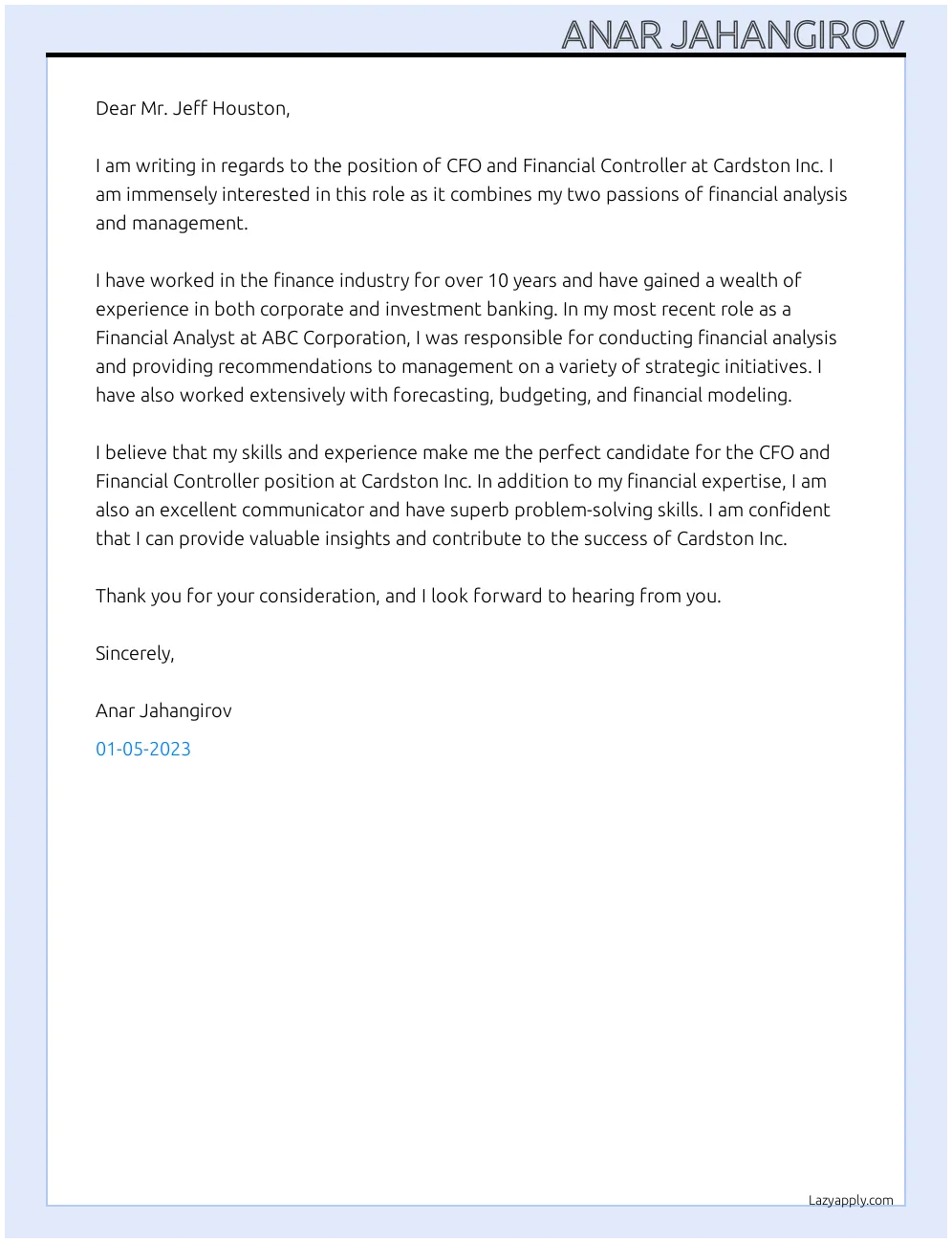
Here are five examples of controller cover letters, each tailored to highlight different aspects of a controller’s expertise and experience. These examples will help you customize your own cover letter to effectively showcase your skills and qualifications. They offer various approaches, from highlighting financial reporting expertise to emphasizing budgeting and forecasting skills, team leadership, internal controls experience, and cost accounting skills. Use these examples as a starting point to tailor your application and increase your chances of landing an interview for your desired controller position. These examples are to assist the candidate.
Example 1 Focus on Financial Reporting
This example focuses on highlighting your expertise in financial reporting. You should begin by emphasizing your experience with preparing and analyzing financial statements, ensuring accuracy and compliance with accounting standards like GAAP or IFRS. Showcase your ability to manage the month-end and year-end closing processes efficiently. Include any experience with SEC reporting or other regulatory compliance. Mention any experience with financial audits and implementing internal controls. In the cover letter, provide specific examples of your contributions to improving the accuracy, timeliness, or clarity of financial reports. Make sure to include information that shows your understanding of financial reporting systems and software.
Key Skills for Financial Reporting
- Financial Statement Preparation and Analysis
- Month-End and Year-End Closing
- GAAP/IFRS Compliance
- Audit Management and Internal Controls
- SEC Reporting (if applicable)
Example 2 Emphasizing Budgeting and Forecasting
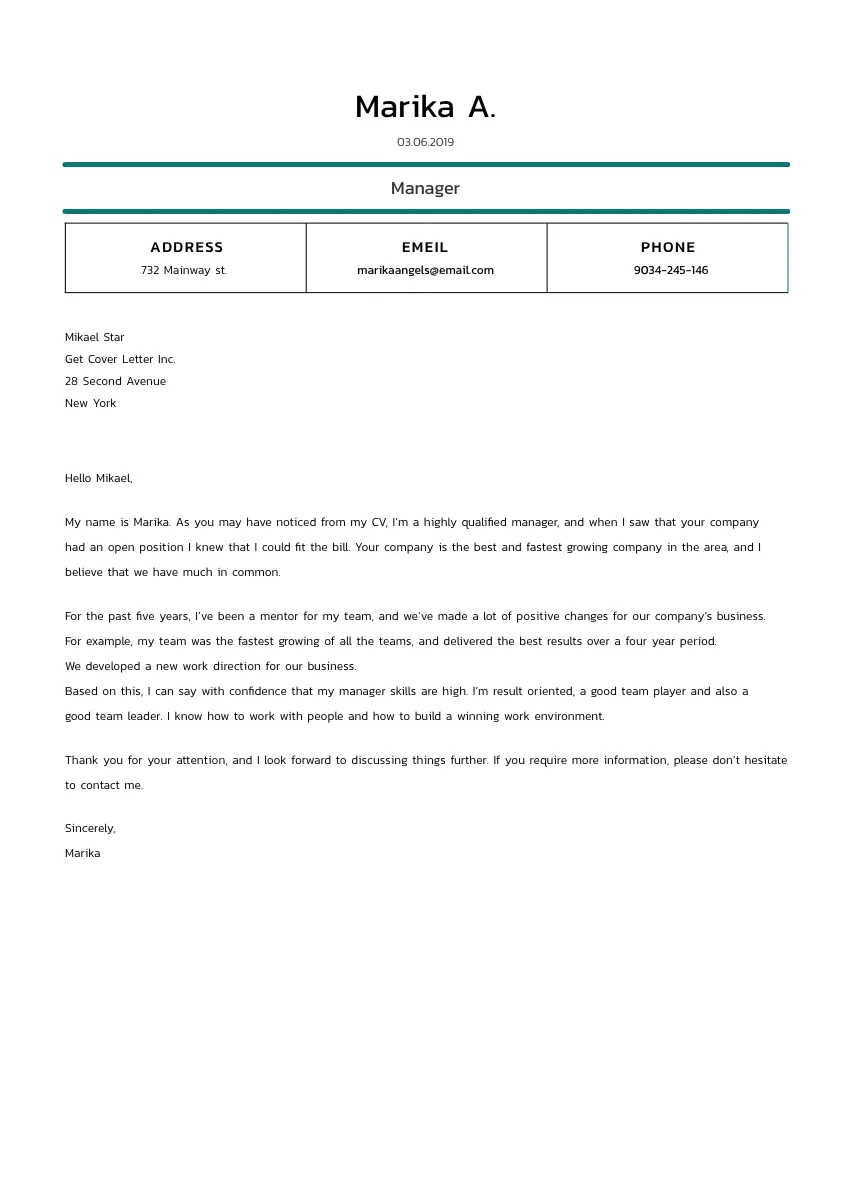
If budgeting and forecasting are core to your expertise, structure your cover letter to highlight these skills. Showcase your experience in developing and managing budgets, including forecasting revenues, expenses, and cash flow. Highlight your ability to analyze variances and provide insights to management. Emphasize your experience with financial modeling and scenario planning. Mention your experience with cost control and optimizing financial performance. In the cover letter, provide specific examples of how you have improved budgeting accuracy or provided valuable financial analysis to support decision-making. Provide examples of the financial modeling and planning that you have done.
Budgeting and Forecasting Important Skills
- Budget Development and Management
- Forecasting and Variance Analysis
- Financial Modeling and Scenario Planning
- Cost Control and Optimization
- Cash Flow Management
Example 3 Showcasing Team Leadership
If you have a strong track record of leading and managing accounting teams, tailor your cover letter to highlight your leadership abilities. Discuss your experience in mentoring and developing team members, and how you’ve created a positive and productive work environment. Mention your ability to motivate and inspire your team to achieve goals. Provide examples of successful projects or initiatives that you have led. In the cover letter, emphasize your communication skills and ability to collaborate with other departments. Showcasing team leadership is essential for demonstrating your suitability for a management position.
Team Leadership Essential Attributes
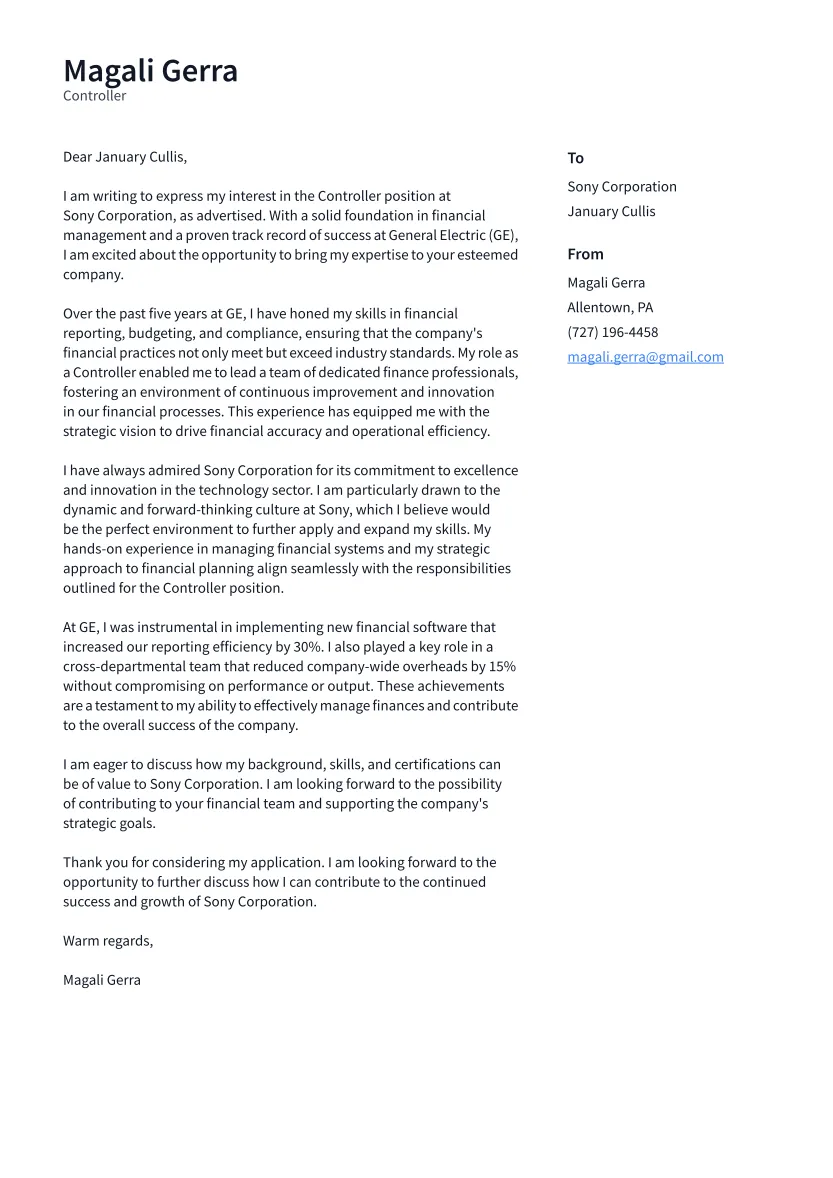
- Team Management and Mentoring
- Project Leadership and Execution
- Performance Management and Feedback
- Communication and Collaboration
- Conflict Resolution
Example 4 Highlighting Internal Controls Experience
For positions that emphasize internal controls, structure your cover letter to highlight your experience in this area. Discuss your experience with implementing and maintaining internal controls to ensure financial accuracy and compliance. Mention your experience with risk assessment and developing control procedures. Highlight your experience with internal audits or SOX compliance. Provide specific examples of how you have identified and mitigated financial risks. In the cover letter, demonstrate your understanding of best practices and your ability to improve financial processes.
Internal Controls Key Responsibilities
- Risk Assessment and Mitigation
- Control Implementation and Maintenance
- Internal Audit and Compliance
- SOX Compliance (if applicable)
- Process Improvement
Example 5 Focusing on Cost Accounting Skills
If the role emphasizes cost accounting, focus your cover letter on your skills in this area. Discuss your experience with cost analysis, variance analysis, and product costing. Mention your experience with standard costing, activity-based costing, or other cost accounting methods. Highlight your experience with implementing cost-saving initiatives and improving profitability. Provide examples of how you have used cost accounting data to support decision-making. In the cover letter, demonstrate your ability to analyze and interpret cost data to identify opportunities for improvement.
Cost Accounting Skills Critical Aspects
- Cost Analysis and Variance Analysis
- Product Costing and Standard Costing
- Activity-Based Costing (ABC)
- Cost Control and Optimization
- Cost Data Analysis and Reporting
Tips for Customizing Your Cover Letter
To make your cover letter stand out, it must be tailored to each specific job application. Review the job description carefully and identify the key skills, experiences, and qualifications the employer is seeking. Highlight the relevant skills and experiences in your cover letter, providing specific examples of your achievements. Research the company and its values. Adapt your cover letter to align with the company’s culture and mission. Use keywords from the job description throughout your letter. This ensures that your application passes through applicant tracking systems (ATS). Customize your letter to reflect the unique requirements of each position. This demonstrates your genuine interest and attention to detail, which will increase your chances of getting hired. Also, remember to remove any irrelevant information.
Tailoring Your Letter to the Job Description
The job description is your roadmap for tailoring your cover letter. Carefully read the job description and identify the key requirements, skills, and qualifications. Highlight your relevant skills and experience in your cover letter, providing specific examples of your achievements. Use keywords from the job description throughout your letter, particularly in the body paragraphs, to align with the employer’s requirements. Tailor the content of your cover letter to match the specific responsibilities and expectations outlined in the job description. This demonstrates your understanding of the role and your ability to meet the employer’s needs, which is essential for landing an interview.
Proofreading and Editing Your Cover Letter
Proofreading and editing are crucial steps in creating a professional and effective cover letter. Errors in grammar, spelling, or punctuation can undermine your credibility and make a negative impression. Before submitting your cover letter, carefully proofread it for any mistakes. Use a grammar and spell checker, but don’t rely on it entirely. Read your cover letter aloud to catch awkward phrasing or sentences that don’t flow well. Ask a friend or colleague to review your cover letter and provide feedback. Ensuring your cover letter is polished and error-free demonstrates your attention to detail and commitment to quality, which are highly valued in financial roles. Take the time to proofread for errors.
Common Mistakes to Avoid
Several common mistakes can diminish the effectiveness of your controller cover letter. Avoid generic cover letters that are not tailored to the specific job and company. Don’t rehash your resume; instead, use the cover letter to provide context and highlight key achievements. Avoid using jargon or overly technical language that the hiring manager may not understand. Don’t make the letter too long. Keep it concise and focused on the most relevant information. Avoid negative language or criticizing past employers. Avoid including irrelevant information or details that don’t align with the job requirements. Taking the time to avoid these pitfalls will increase the effectiveness of your cover letter.
Formatting for Success
Proper formatting is vital for creating a professional and easy-to-read cover letter. Use a clean and professional font, such as Arial, Times New Roman, or Calibri, and maintain consistent font sizes throughout the document. Use single spacing and add a blank line between paragraphs to improve readability. Use a professional business letter format with proper margins, alignment, and indentation. Ensure your contact information is clearly displayed at the top of the letter. Save your cover letter in a professional format, such as PDF, to ensure that the formatting remains consistent. Proper formatting makes your cover letter visually appealing and easy to read, which is crucial for a positive first impression.
Final Thoughts Writing a Winning Cover Letter
A compelling controller cover letter can significantly increase your chances of landing an interview. By understanding the key components, tailoring your letter to each job description, and avoiding common mistakes, you can create a winning cover letter that showcases your skills, experience, and achievements. Remember to highlight your financial expertise, leadership abilities, and quantifiable results. Proofread and edit your letter carefully, and use proper formatting to ensure a professional presentation. By following these tips and using the examples provided, you can create a cover letter that effectively communicates your value and helps you secure your dream controller position. Good luck on your job search!
